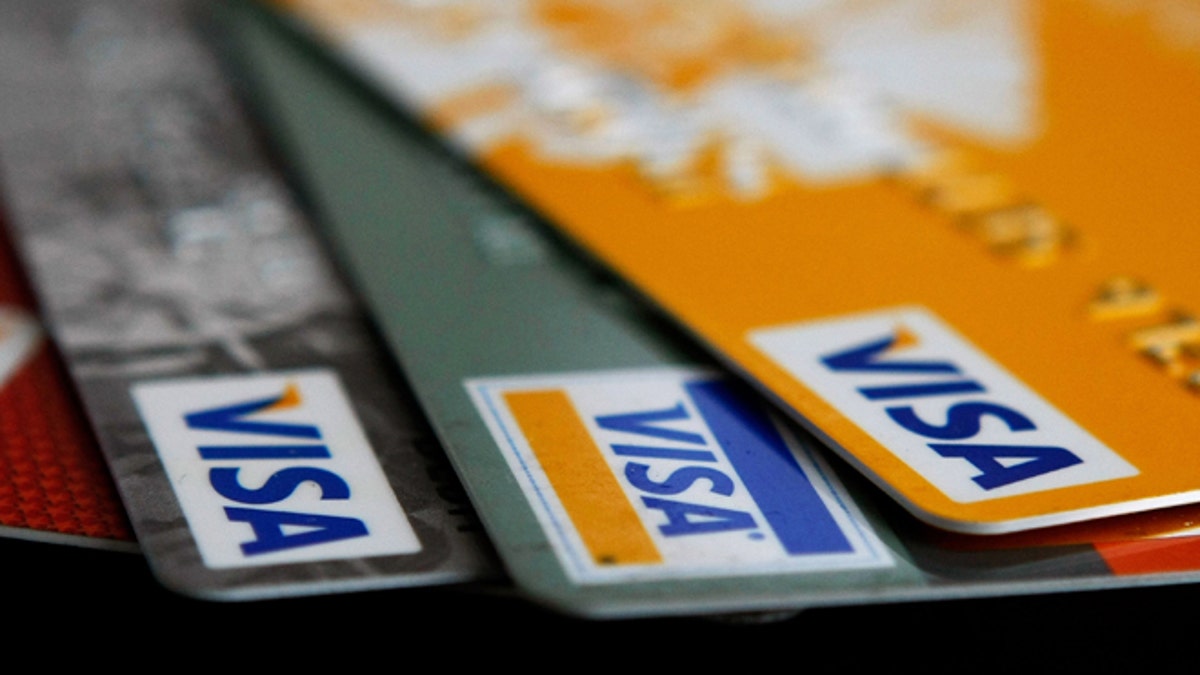
SAN FRANCISCO - FEBRUARY 25: Visa credit cards are arranged on a desk February 25, 2008 in San Francisco, California. Visa Inc. is hoping that its initial public offering could raise up to $19 billion and becoming the largest IPO in U.S. history. (Photo Illustration by Justin Sullivan/Getty Images) (2008 Getty Images)
Prepaid debit cards have a reputation for being slightly dubious financial products. In the early years of prepaid, finding a consumer-friendly card was near impossible.
The market was plagued by hidden fees, murky terms and questionable customer service. While nowhere near perfect, the industry is gradually cleaning itself up. Consumers now have access to a number of options that can cost about the same as or less than a bank checking account. Still, prepaid seekers should proceed with caution.
Here's a review of two halfway decent prepaid debit cards that target the Hispanic demographic.
Univision MasterCard
The Univision MasterCard minimizes the number of different fees cardholders are liable to incur. The fee structure is simple and clear—admirable in the world of prepaid debit. The primary cost of holding a card is the monthly maintenance fee. At $9.95 a month, cardholders will pay a minimum of $119.40 a year. That's comparable to some bank checking accounts (including Chase) that charge $10-$15 monthly.
The biggest ancillary cost customers are likely to encounter is when loading money onto the card. Univision does not charge a fee for paychecks transferred using direct deposit. However, without direct deposit, cardholders must use retailer services like MoneyGram to add money. MoneyGram charges $3.95 per deposit. By making just two deposits a month, customers will pay $94.80 in reload fees every year, bumping the total annual cost up to a minimum of $214.20.
The price of holding the Univision MasterCard certainly isn't negligible, but cardholders are less likely to be slapped with unexpected fees than with other cards. Unlike some competitors, Univision does not charge extra for making purchases, calling customer service or making in-network ATM withdrawals. This card is best for folks who are struggling to open a bank account and will use direct deposit when adding money.
Coopera Prepaid Reloadable Visa
The Coopera Prepaid Visa has the unique advantage of being offered through a number of credit unions. This allows cardholders to make free in-person deposits (2 per month) at local financial institutions. Whereas most cards require payment through a retailer service to add money, the Coopera Card uses its relationship with credit unions to spare cardholders the added expense.
The monthly fee is only $5.95, which, at $71.40 annually, is significantly less than the cost of the Univision Card. A customer could feasibly limit the cost to $71.40 per year by carefully avoiding additional services. Unfortunately, the Coopera does come with a pretty lengthy list of potential fees.
A simple ATM withdrawal costs $1. An ATM balance inquiry is another $1. Replacement cards are $15. To speak with a customer service rep, it's $1.50. Paper statements cost $1 each.
For consumers who anticipate needing a lot of additional services (including frequent ATM withdrawals), the fees of the Coopera Prepaid can add up quick. However, the Coopra can be an affordable option for those who need only to load money for electronic spending.
How do these cards compare?
For all their advantages, the Univision and Coopera aren’t as good as some prepaid debit cards issued by big-name banks. The Chase Liquid, for example, gives free replacement cards, free customer service and free paper statements, for a $4.95 monthly fee. The US Bank Convenient Cash has a $3 monthly fee and has free cash deposits at bank branches and free withdrawals at bank ATMs; the American Express Bluebird’s only fee is $2 for ATM withdrawals if you don’t use direct deposit.
So while the cards are generally better than most offers you see out there, they’re still not the best.
Prepaid vs. checking
Opening a checking account with a bank or credit union is almost always better than applying for a prepaid debit card. The fees tend to be lower and more predictable.
While banks like Chase have started charging maintenance fees in excess of $10 a month, there remain plenty of viable alternatives. Credit unions and online banking institutions (like PerkStreet Financial) often offer free and rewarding checking options. Also, keep in mind that prepaid cards do not build credit history. Consumers looking to add a few points to their credit score should look for a good credit card instead.
Anisha Sekar manages credit and debit products at NerdWallet.com, an unbiased source for financial decision-making.
Follow us on twitter.com/foxnewslatino
Like us at facebook.com/foxnewslatino
Like us at facebook.com/foxnewslatino
